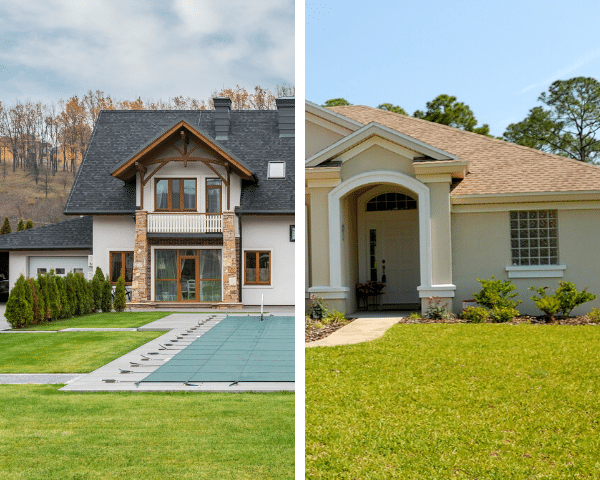
Whether you’re looking into it now or thinking about investments in the future, you might be wondering which league you want to play in the real estate investing game — the low end or high end? Much like any investment, you must know your numbers. We share the things you need to know before choosing between low-end and luxury real estate investing. But first, we need to know what these two mean.
Low-end real estate targets the lower to middle class market. This means investing in standard starter homes, which are located in second-class neighborhoods – but good and acceptable. It could also mean investing in multi-family dwellings—perhaps even living in one and renting the other(s). On the other hand, luxury real estate is for high-end buyers who want prime locations with access to lavish lifestyles or unique experiences like living on the oceanfront. The Institute for Luxury Home Marketing defines the luxury market as the top 10% of the market’s price range but never less than $500,000. In parts of California and New York (among many other areas), starter homes cost well over $500K.
Let’s dive into some numbers and compare a 1 million-dollar luxury property and we have a $300,000 low-end property.
As an investor, you would want to know what is going to increase in price in the future.
Let’s look at the luxury property first:
If you buy a property for $1M, and make a 20% deposit of $250K and borrow 80%. For you to make a 20% profit on your investment, the property will have to be worth $1.2M at some point in the future to make your money back; that’s because of the cost of the purchase..
Now let’s look at the low-end property:
If you buy a $300,000 property and borrow 80%, you need approximately $60K for the 20% deposit. For you to make a 20% profit, you only need the property to be worth $360K at some point in the future to make your money back; that’s because of the cost of the purchase.
If we look at it, it’s fair to say that you can save a $60K deposit a lot faster than a $250K deposit. You will also have lower loans to repay for low-end vs high-end.
But what if you already have a $250K deposit on hand and can afford loan repayments on $800K, why not just go for the high-rollers’ game? Another thing to consider is demand. The property market is driven by competition and there is far more of the population that chooses basic, affordable homes vs luxury. With that money, you can purchase 3 non-luxury, more sellable properties vs 1 luxury property.
To sum up, in lower-end real estate, you need lower capital, which makes it especially appealing to small-time investors. You also have more potential buyers who can afford it. In high-end real estate, on the other hand, is a resource reserved for people with a lot of capital to spend on prime residential property.
It all boils down to what your risk appetite is and what type of business excites you. So whatever game you play, do it well. And you can always rely on a good realtor and teammate like Broadpoint Properties to help you guide you through the process of real estate purchase and property management.



